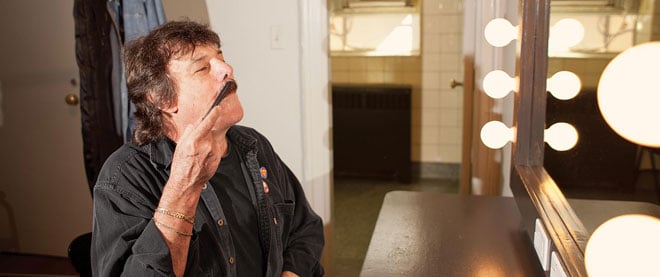Burton Cummings, poet and player
The singer’s mother thought his soon-to-be-published book of poems, one of the best things he’s ever done
Photograph by Jessica Darmanin
Share

Burton Cummings has a couple of favourite phrases to describe his status as a rock ’n’ roll survivor: “I haven’t exactly lived the life of a Buddhist monk,” and “I’m not quite ready to move to Lourdes.” He’s used them many times in the past, and he does so again on the phone from his home in Los Angeles. And yet the singer, songwriter, pianist and bon vivant who once forced his old band, the Guess Who, to cancel a Carnegie Hall date because he’d been up all night partying with the Grateful Dead, hasn’t been drinking “for quite a while now.” He’s quit smoking, too.
“For a guy that’s going to be 65 right away I’m in pretty good shape,” Cummings says, referring to his New Year’s Eve birthday. His vigour shows on his new release, Live at Massey Hall, a greatest hits album recorded at the Toronto venue in 2010 and 2011. On it, he delivers songs from his Guess Who days and solo career with untrammelled gusto, including his soaring hit Stand Tall, which he performed at a Massey Hall engagement in 1976, but “didn’t sing for years because I didn’t think I could do it justice.”
Nick Sinopoli, a vocalist and percussionist with Cummings’ band, the Carpet Frogs, is in awe of the voice: “He can blow-dry my hair with the monitors.” Before Cummings adopted the Frogs in 1999, they were a Toronto-based cover band singing Guess Who classics such as No Time and Hand Me Down World; Sinopoli was happy to step aside for the real thing. And lately, Cummings is “hitting all these [notes] that were ‘the young Burton.’ ”
Cummings, one of Canadian music’s great characters, is in a generally effusive mood. Where it once bothered him that the Guess Who, which he fronted from 1965 to 1975, carried on after he left—long-time bassist Jim Kale and drummer Garry Peterson continue to tour with temporary members—he’s more sanguine about it now. “The name ‘Guess Who’ has already ended up with no credibility. They still use my voice and Randy [Bachman]’s guitars to promote their shows, but I don’t think about them too much. I’m far too busy.”
And while Live at Massey Hall may celebrate the past, a volume of poetry represents the future. He plans to publish the book, The Writings of B.L. Cummings, even though one publisher critiqued it as “pretentious drivel.”
The criticism “doesn’t break my heart,” he says. “I’ve had literature professors emailing me thinking it was brilliant. I wrote this from the heart, from the soul, and I’m going to have it come out exactly the way I want. It’s not that I don’t care what people think,” he says, chuckling, “but I don’t care what people think.”
One significant exception was his mother, Rhoda, who read the collection before she died in his hometown of Winnipeg in May. She “was really pleased—she thought that was one of the best things I’ve ever done.”
Cummings is now going through her possessions, an experience he finds bittersweet. “I’m seeing things that I never saw before,” he says. “Pictures of my dad, [who] left when I was very young. I never knew him, and my mother kept all these pictures from me all these years.
“I’m the last Cummings now,” says the singer, an only child. He and his wife of 31 years, Cheryl DeLuca, didn’t have children. “All the family stuff has ended up with me, and it’s been very heavy, the past few months.” Despite the loss, Cummings maintained his concert schedule. “I’m sure [the singing] did help him, and being around people,” says Sinopoli, who recalls Cummings playing concerts with a dislocated shoulder; with the flu; and in 38-degree heat on an outdoor stage. The second Massey Hall show captured on the album was recorded the week after Cummings’ dog, Toast, died. In every case, “he got through. He’s of that era where the show must go on.”
Cummings used to idolize the charismatically dissolute likes of Jim Morrison, but now he looks up to his elders. “People like Steve Miller and Tony Bennett and [Paul] McCartney—they’re my new heroes. I’m turning into one of those guys, hopefully. When it gets lame, I won’t do it anymore—I won’t get out there onstage and stay at it too long. But it’s not lame yet.”